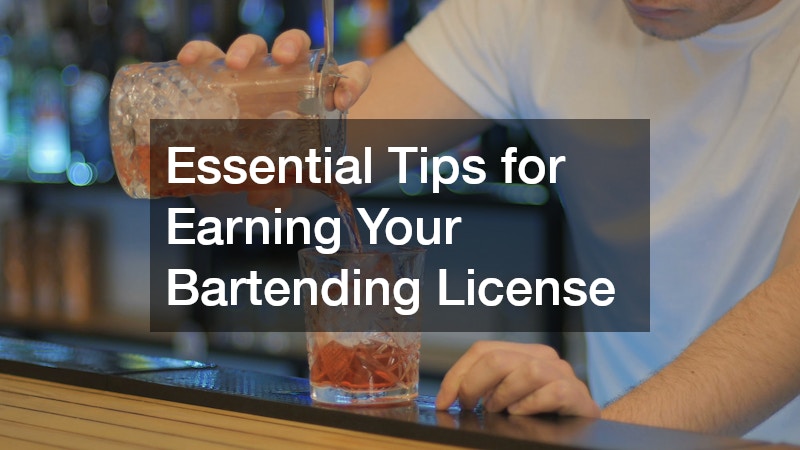Embarking on a career in bartending can be a rewarding experience, offering not just creative freedom but also significant financial gain. However, before you can work behind the bar, obtaining a bartending license is a crucial step. This article will guide you through the essential tips and frequently asked questions associated with earning your bartending license.
What Are the Requirements for Obtaining a Bartending License?
Each state has its own set of regulations and requirements for obtaining a bartending license. Understanding the minimum age for bartenders, necessary certifications, and specific regulatory obligations in your state is paramount to beginning your licensing journey.
Regulations ensure that bartenders are equipped to handle situations responsibly, which is crucial for maintaining a safe and enjoyable environment for patrons. Familiarizing yourself with these requirements ahead of time can help you navigate the licensure process efficiently.
The starting point for many is identifying the legal age for serving alcohol, which varies by state, typically ranging from 18 to 21 years old. In addition to age, some states mandate specific alcohol awareness or safety courses that culminate in certification before applying for a license. Staying informed about your state’s particular necessities will prevent delays in your licensing process and lay a solid foundation for your career.
Licensure not only emphasizes compliance with state laws but also enhances your credibility as a bartender. Many training programs offer comprehensive modules that cover customer service, drink preparation, and responsible alcohol service, aligning with state regulations. These programs provide essential knowledge and skills vital for anyone eager to ensure they meet the regulatory standards of their area.
How Long Does It Take to Get a Bartending License?
The time required to earn a bartending license can vary widely based on your location, chosen course, and the time you dedicate to studying and completing the necessary requirements. In some cases, students can complete their courses online within a week, while others might take several weeks when opting for in-person training. Balancing the intensity of the course with your schedule is crucial for completing your training efficiently.
Online courses often offer self-paced study options, allowing you to progress at your own speed without compromising the depth or quality of the learning materials. For in-person training, the course duration can vary depending on the institution, sometimes involving intensive weekend courses or evening classes that span several weeks. With clear goals and a diligent approach, many trainees find that dedicating consistent daily time to study ensures on-time or even early completion.
Consider seeking programs that provide a flexible learning schedule, allowing you to balance other commitments alongside your bartending education. Whether online or in-person, thoroughly researching each program’s timeline and prerequisites can guide you to the option best suited to your personal circumstances and career aspirations.
What Are the Costs Associated with Obtaining a Bartending License?
The cost of earning a bartending license depends largely on the chosen training avenue, varying significantly between traditional and online institutions. On average, tuition may range from $50 to several hundred dollars, influenced by the comprehensiveness of the course and the provider’s reputation. Considering this investment, prospective bartenders should weigh their educational options carefully against their budget constraints.
In addition to tuition, prospective bartenders should factor in ancillary costs, including licensing fees and study materials. Some programs might include these in the course fee, while others may charge separately. Exploring programs that offer comprehensive packages can help mitigate unexpected expenses, providing better economic planning for students undertaking this educational commitment.
To ease financial burdens, some institutions and states offer scholarship opportunities or financial assistance to aspiring bartenders. Investigating these options during program selection can provide vital support, ensuring that financial limitations do not hinder your path to licensure. With careful financial planning, obtaining a bartending license can be a feasible and strategic career step.
Do You Need Experience to Get a Bartending License?

While experience in bartending can be beneficial, it is not always a prerequisite for obtaining a bartending license. Various training programs offer structured environments for learning valuable bartending techniques and safety protocols. Such courses are designed to equip novices with both the theoretical knowledge and practical skills necessary to excel in bartending, even without prior experience.
These programs offer a comprehensive overview of key bartending tasks, including mixing drinks, understanding liquor, and operating bar equipment. Participating in these guided courses helps build a strong foundation in the essentials of bartending, bridging gaps for those entering the industry without prior hands-on experience. Moreover, structured learning can enhance confidence, which is crucial for beginner bartenders stepping into professional environments.
Licensed bartending courses often highlight industry best practices and customer service skills, ensuring the personal and professional development of future bartenders. By completing these programs, individuals demonstrate dedication and readiness to meet the demands of the profession, paving the way for employment opportunities in diverse hospitality settings. Training constitutes an invaluable step for those aspiring to transform a passion for bartending into a successful career.
Obtaining a bartending license is a crucial and essential step for anyone seeking to pursue a career as a professional bartender. By understanding the requirements, timelines, costs, and potential training benefits, aspiring bartenders can effectively prepare themselves to succeed in this dynamic field. No matter where you are starting from, these tips and insights will help guide you on your journey to earning your bartending license and kicking off a successful bartending career.


